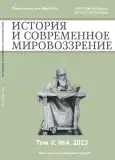On the Question of Cadet Participation in the Organization of Fire Fighting in the Ural (1930s — 1940s)
- Авторлар: Lozhkarev A.I.1, Skipskiy G.A.2
-
Мекемелер:
- Ural Institute of State Fire Service of the Ministry of Emergency Situations of Russia
- Ural Law Institute of the Ministry of Internal Affairs of Russia
- Шығарылым: Том 5, № 4 (2023)
- Беттер: 119-125
- Бөлім: HISTORY OF SCIENCE AND TECHNOLOGY
- URL: https://journal-vniispk.ru/2658-4654/article/view/252189
- EDN: https://elibrary.ru/XUBLEG
- ID: 252189
Дәйексөз келтіру
Аннотация
The article is devoted to the study of the historical experience of practical training of cadets of the Sverdlovsk Fire-Technical School of the NKVD of the USSR — Sverdlovsk Fire-Technical School of the Ministry of Internal Affairs of the USSR in the pre-war period, during the Great Patriotic War and in the first post-war years. The purpose of this study was to study the issues of organizing the service of cadets as part of the fire garrison of the city of Sverdlovsk, to analyze specific examples of their direct participation in extinguishing fires, both within the city and in various areas of the Sverdlovsk region and other regions of the Ural region. The authors paid special attention to the problem of combining practical and theoretical training for cadets, the costs of organizing the educational process, and the reasons for the underestimation of theoretical training in the historical period under study. The theoretical basis of the study was the works of domestic, and, above all, Ural historians and specialists in the field of fire protection history. The source base for the authors' research was archival documents stored in the collections of the Documentation Center for Public Organizations of the Sverdlovsk Region, the State Archive of the Sverdlovsk Region and the archive of the Ural Institute of the State Fire Service of the Ministry of Emergency Situations of Russia. The methodological basis of the research was the methods of historicism, content analysis, interdisciplinary approach, as well as such general scientific methods as analysis and synthesis. The authors adhere to the concept of the predominance of a technocratic approach in training personnel for the Soviet fire department, determined by the paradigm of industrialization and cultural revolution in the USSR.
Негізгі сөздер
Толық мәтін
##article.viewOnOriginalSite##Авторлар туралы
Alexander Lozhkarev
Ural Institute of State Fire Service of the Ministry of Emergency Situations of Russia
Хат алмасуға жауапты Автор.
Email: lozhkarev952@mail.ru
Cand. Sci. (Philos.), Associate Professor, Department of Philosophy and Humanities
Ресей, YekaterinburgGeorgiy Skipskiy
Ural Law Institute of the Ministry of Internal Affairs of Russia
Email: skipsky.georgy@yandex.ru
Cand. Sci. (Hist.), Associate Professor of the Department of Theory and History of State and Law
Ресей, YekaterinburgӘдебиет тізімі
- Abramov V. A. History of fire protection. Part 1. M., State Fire Service Academy of the Ministry of Emergency Situations of Russia. 2005. 151 p.
- Skipsky G. A. Historical experience of personnel policy in internal affairs bodies in the 1950s (on the example of the Sverdlovsk Fire-Technical School of the Ministry of Internal Affairs of the USSR // Bulletin of the Tyumen Institute for Advanced Studies. 2018. 1(10). P. 17–26.
- Skipsky G. A. On the history of the formation of educational organizations of internal affairs bodies in the Urals in the 1920s and early 1930s. / G. A. Skipsky, A. I. Lozhkarev // Bulletin of the Ural Law Institute of the Ministry of Internal Affairs of Russia, 2021. — No. 1 (29). pp. 129–137.
- Ilyin, V. V., Meshalkin, E. A. History of fire protection in Russia: textbook / V. V. Ilyin, E. A. Meshalkin. — M.: Academy of State Fire Service of the Ministry of Emergency Situations of Russia, St. Petersburg. GPU, 2003. 368 p.
- Lozhkarev A. A., Cherkassky G. A. «Clearness and strict military discipline of the entire organization and activities of the school are especially necessary during the Patriotic War against the fascist barbarians...». Firefighter cadets of the Urals during the Great Patriotic War of 1941–1945. Military History Magazine 2020. No. 9. pp. 72–78.
- Lozhkarev A. A., Cherkassky G. A. One moment away from trouble. // Culture and security. 2021. pp. 37–42.
- Lozhkarev A. I., Skipsky G. A., Lugovoy A. A. On the problems of organizing and implementing personnel training for the fire department of the USSR in the 1960s. (using the example of the Sverdlovsk Fire-Technical School of the USSR Ministry of Internal Affairs). // Bulletin of the St. Petersburg University of the State Fire Service of the Ministry of Emergency Situations of Russia. 2016. No. 4. pp. 141–147.
- Lozhkarev, A. I. «I really want to become a real commander of the Soviet fire department...». Sverdlovsk school of middle command staff of the GPO NKVD of the USSR and its cadets on the eve of the Great Patriotic War: a scientific and journalistic essay. Ekaterinburg: Ural Institute of State Fire Service of the Ministry of Emergency Situations of Russia, 2023. 107 p.
- Mironov M. P., Ivanov V. E., Snezhinsky A. V. Ural Institute of the State Fire Service: pages of history and development. / M. P. Mironov, V. E. Ivanov, A. V. Snezhinsky. // Fire and explosion safety 2009. No. 2. pp. 5–7.
- Skipsky G. A. From school to college. Sverdlovsk Fire-Technical School of the Ministry of Internal Affairs of the USSR in 1945–1960. Historical and journalistic essay. / G. A. Skipsky, A. I. Lozhkarev. Ekaterinburg: Ural Institute of the State Fire Service of the Ministry of Emergency Situations of Russia, 2011. 80 p.
- Snezhinsky A. V. Sverdlovsk fire-technical school in the pre-war and war years (1938–1945): historical and journalistic essay / A. V. Snezhinsky, A. I. Lozhkarev, V. E. Ivanov, G. A. Skipsky. Ekaterinburg, URI State Fire Service of the Ministry of Emergency Situations of Russia. 2009. 61 p.
Қосымша файлдар








